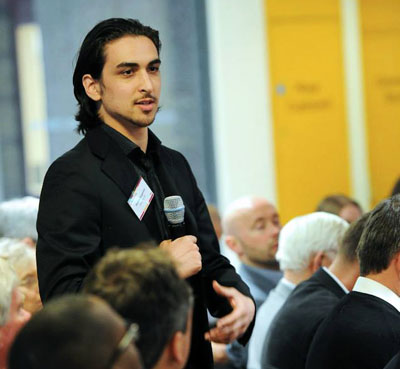Teach us how and we will engage in politics

In 2015 we have another general election looming in the UK and yet again we have a danger of marginalising young people. The next generation, often being portrayed as disinterested in how society is run and set up, have often been ignored by the current political elite.
Judging each grouping in society by how many votes they can get by listening to them, the low youth turn-out makes it an appealing grouping to ignore. With no real power, we are belittled and pushed aside.
Yet, the fact remains that we are not without power. Like the idea of the sleeping giant, powerless while sleeping, if awakened it can shift mountains. The youth demographic compared to other age groups is much bigger and if mobilised can finally shift politics making representation and the laws relating to young people fairer.
Why is it important to take this new section of society seriously? After all, of course, they have not started paying taxes, neither have they really 'lived'. The next generation is exactly what it is: the next generation to inherit the planet - with all the ups and downs the last generation left it with. As such, it is our duty as young people to speak up about how we wish the world to look like and our right to be able to do so and be heard.
More and more, young people across Britain are becoming interested in politics and this could not have been made clearer by the Scottish referendum which saw the highest political involvement in generations. Yet, an issue still remains. The issue of political education has reached its peak as young people are more interested in social issues now than ever before as they, with thanks to social media and the internet, have the 'world' at their fingertips. This peak of interest has led to mass rallies around the world with Occupy, The people's Assembly, Anonymous and grassroots campaigns being just a small number of examples. This surge in political engagement, however, has not been linked with voting as the lack of political and democratic understanding, throughout society means people do not see the clear link between the issues they care about and the democratic process.
Currently, we are expected to receive all the information required to participate in this democracy via our parents and political parties. This sadly opens up the next generation to the bias of the last, as parents will influence a politically illiterate child and political parties will bring them to support the ideals they represent; never giving the next generation breathing room to make up their own mind.
A good solid and unbiased education in politics at GCSE level for everyone would give young people the information they need and require to become active citizens of this society. The subject required would not teach young people about the history of the Conservative and Labour parties - after all, do you learn about the history of Google and Facebook in business studies?
Democracy is rare in this world. We are lucky enough to be able to speak our mind and influence our politics without fear of violent retribution, unlike in many parts of the world. Yet our ability to participate is being thwarted by the lack of knowledge we currently possess, which is directly resulting in the growing trend of apathy towards the democratic system you so often see in British young people today.
Matteo Bergamini is the Founder of Shout Out

